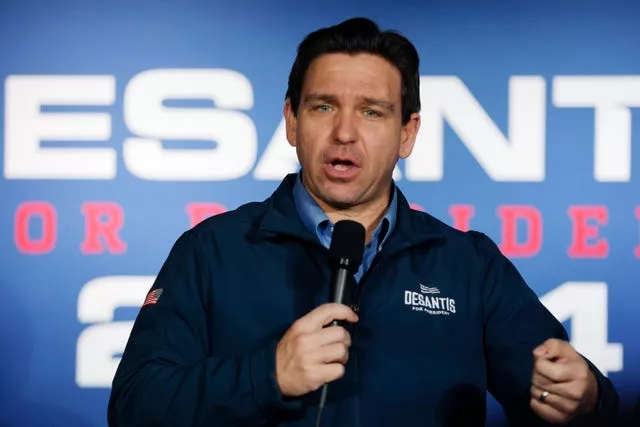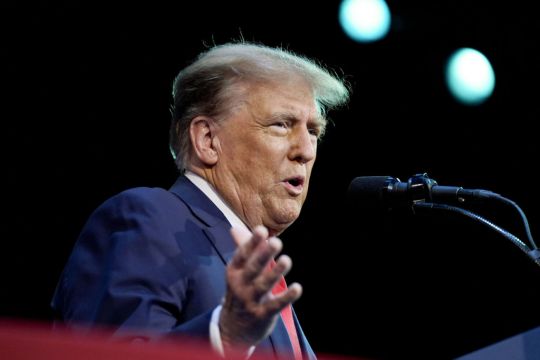Donald Trump has celebrated one-time Republican rival Ron DeSantis as his newest supporter after the Florida governor ended his presidential campaign and endorsed the former president.
For Mr Trump, it has become a familiar ritual to welcome the backing of someone who once tried to take him on.
Nonetheless, it was notable at Sunday’s rally in New Hampshire to see Mr Trump praise Mr DeSantis without calling him “DeSantimonious” or “DeSanctus”, putting an end to perhaps the most bitter rivalry of Republicans’ 2024 campaign.
“I just want to thank Ron and congratulate him on doing a very good job,” Mr Trump said at the outset of his remarks.

“He was very gracious, and he endorsed me. I appreciate that, and I also look forward to working with Ron.”
Mr Trump described Mr DeSantis as “a really terrific person”.
Earlier in the day, Mr DeSantis said via video that he would be ending his campaign two days before New Hampshire’s first-in-the-nation Republican primary.
But, Mr Trump’s glee on Sunday night aside, it was not the warmest of endorsements.
“It’s clear to me that a majority of Republican primary voters want to give Donald Trump another chance,” Mr DeSantis said, offering matter-of-fact analysis through a forced smile without adding plaudits for Mr Trump.
“I signed a pledge to support the Republican nominee, and I will honour that pledge,” he continued, before adding a dig at the remaining contender, Nikki Haley.
Mr DeSantis described the former UN ambassador and one-time South Carolina governor as a stand-in for “the old Republican guard of yesteryear, a repackaged form of warmed-over corporatism”.
Mr Trump seemed unbothered by Mr DeSantis’ approach, striking a tone of camaraderie as fellow political combatants.
“I will tell you it’s not easy,” Mr Trump said on Sunday night in Rochester.
“They think it’s easy doing this stuff, right? It’s not easy.”
The former president seemed to revel in skewering Mr DeSantis throughout the campaign, often making clear it was a personal grudge because he considered the governor’s decision to run in the first place an act of disloyalty.

Mr Trump endorsed Mr DeSantis, then a congressman, in a competitive 2018 Republican primary for Florida governor.
Mr DeSantis went on to win the nomination and the general election. By the time Mr DeSantis won a landslide re-election four years later, though, he was positioning himself for his own White House campaign.
As recently as November, Mr Trump came to Florida and addressed a boisterous crowd at a state Republican meeting standing in front of a sign that read: “Florida is Trump Country.”
That evening, Mr Trump did not mention Mr DeSantis until more than 30 minutes into his speech. Even then, it was to brag about polls showing his advantages over the governor.
“I endorsed him, and he became a rocket ship in 24 hours,” Mr Trump said, claiming that Mr DeSantis had begged for his endorsement.
“Now he’s like a wounded falling bird from the sky.”
Mr Trump never did debate Mr DeSantis or any other 2024 rival. He has said he would not until one proves they are a legitimate threat to him winning the nomination.
Mr DeSantis concentrated his campaign in recent months in Iowa, where he finished in second place in last week’s caucuses — 30 percentage points behind Mr Trump and barely ahead of Ms Haley.
Ms Haley, meanwhile, has long prioritised New Hampshire as a potential springboard ahead of her home-state South Carolina primary next month.
In Iowa, APVoteCast surveys of caucusgoers suggested Mr DeSantis’s supporters were much more likely than Ms Haley’s to consider themselves conservatives who would back Mr Trump no matter what if he wins the nomination and faces President Joe Biden in November.
If that trend holds in New Hampshire, then Mr Trump could expect at least some boost from Mr DeSantis dropping out, and whatever he gets could stretch out his margin and frustrate Ms Haley’s ability to claim any momentum.
Indeed, Mr Trump’s aides have said they expect Mr DeSantis’ support around the country will shift heavily to Mr Trump.
Mr Trump noted on Sunday that he won New Hampshire’s 2016 primary by about 20 points. He lost the battleground state twice in general elections.







